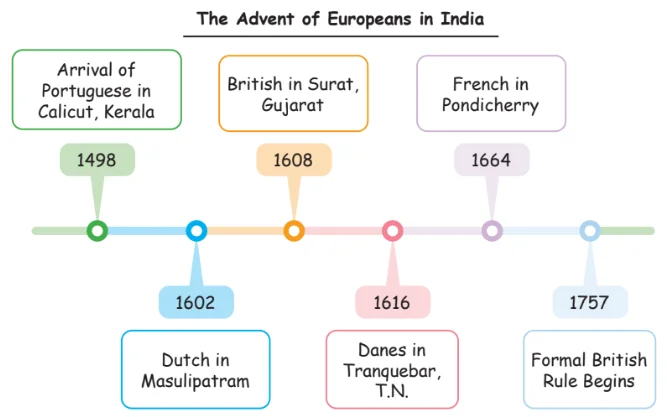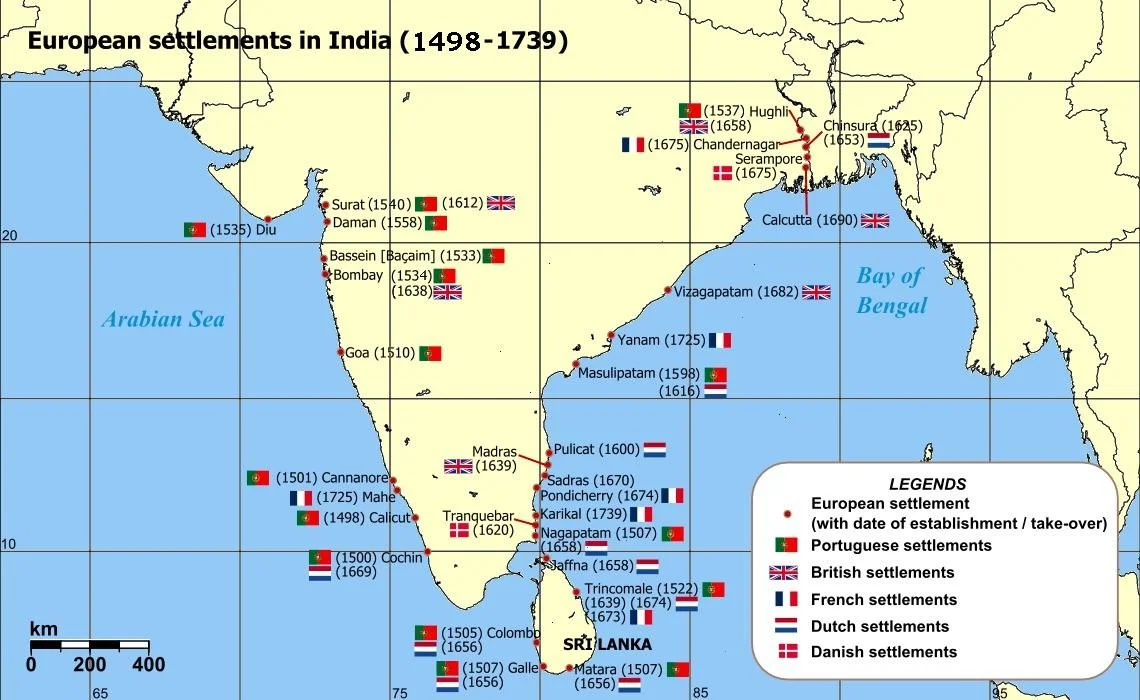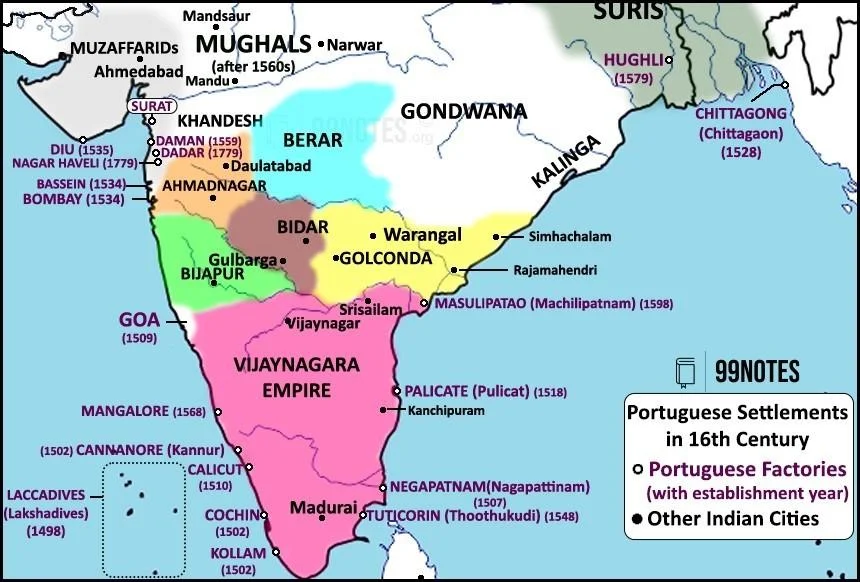History is always viewed in continuity. It is not always easy to distinguish clearly when one period ends and another begins. Modern India began with the advent of the Europeans. The advent of Europeans in India marks a pivotal chapter in world history, as it set the stage for significant cultural, economic, and political transformations on the Indian subcontinent. This period of the Age of Exploration began in the late 15th century and extended into the 19th century. It was characterized by European powers, primarily Portuguese, Dutch, English, and French, seeking to establish trade routes and dominance in various parts of Asia, including India.
India in Global Relations
Relationship with World: For centuries, India had established trading relations with Europe, evident through the discovery of large amounts of gold and Roman goods, particularly during the Sangam age.
- Mode of Exchange: These exchanges took place along three main routes, including the Silk Route via the Amu Darya River, Caspian Sea, and Black Sea, as well as routes via the Arabian Sea and the Mediterranean.
- Italian merchants dominated this trade, leveraging their geographical advantage over the Mediterranean Sea to amass great power.
Enroll now for UPSC Online Course
Key Factors Contributing to the Arrival of Europeans:
Search for Direct a Sea-route to India: In 1453, Constantinople fell to the Ottoman Turks, solidifying their control over the land routes to the East, and resulting in inflated prices for valuable commodities.

- Both the Sea routes (Red Sea) and land routes were dominated by Arab traders. Faced with these circumstances, Europeans were determined to find a direct sea route to India.
- Discovery of the Sea-route: The quest for a maritime route from Western Europe to the East led to Bartholomew Diaz, a Portuguese explorer, reaching the southern tip of Africa in 1488, a landmark known as the Cape of Good Hope.
- In 1498, Vasco da Gama successfully landed in India, further fueling European interest in the East.
- Role of Strong Monarchs: The emergence of centralized states led by strong monarchs, exemplified by Portugal and Spain, encouraged exploratory endeavors and lent support to intrepid navigators.
- Technological Progress: Advancements in technology, including the compass, astrolabe, gunpowder, printing, and cartography, significantly eased the tasks of explorers and navigators.
- Profit and Religious Motives: Tales of the opulence and exotic riches of Asian countries, coupled with a zeal for spreading Christianity and achieving glory, inspired explorers and adventurers.
- Emergence of Idea of Joint Stock Company: The rise of Joint Stock Companies allowed for the pooling of capital from numerous shareholders, ensuring business continuity, liquidity, and flexibility for capital movement, all of which proved to be advantageous for European trading companies.
- Consequently, the joint stock company became the preferred method of organizing business, enabling European trading enterprises to assert dominance in East Indian trade.
These factors collectively set the stage for the advent of Europeans in India, marking a significant turning point in the history of global trade and exploration.

The Portuguese in India
The arrival of the Portuguese in India in 1498 was a pivotal moment in maritime exploration and counted as the early stages of colonialism. It opened the doors for the other European powers to exploit the riches of India in terms of raw materials, spices being the most prominent.

Factors that Fuelled Portuguese Arrival and Rule in India
- Impact of the Spirit of Renaissance: In the 15th century, Europe was swept by the Renaissance spirit, and this ignited exploration.
- Advancements in ship-building and navigation fueled a desire for adventurous sea voyages to discover the unknown East.
- Economic Progress: Progress of economy in Europe, with expanded cultivation, improved plows, scientific crop management, and increased meat supply, led to a heightened demand for oriental spices.
- Venice and Genoa, once thriving from oriental trade, were unable to rival the powerful Ottoman Turks or undertake major explorations.
- Northern Europeans supported Portugal and Spain financially and with manpower, while Genoese provided ships and technical expertise.
- Prince Henry of Portugal, known as the ‘Navigator’, was obsessed with finding an ocean route to India and circumventing Muslim dominance in the Mediterranean.
- Pope Nicholas V granted him the right to navigate to the Orient and India, aiming to counter Islamic influence and spread Christianity. However, Prince Henry passed away before realizing his dream.
- In 1488, Bartholomew Dias, a Portuguese navigator, rounded the Cape of Good Hope, believing he had discovered the long-sought sea route to India.
- Ten years later, a Portuguese expedition reached India in less than eleven months in May 1498.
- India’s Political Stage: During this period in India, except for Gujarat ruled by Mahmud Begarha, the northern part was fragmented among numerous small powers.
- In the Deccan, the Bahmani Kingdom was disintegrating into smaller states.
Enroll now for UPSC Online Course
- Organized and Skilled Merchants/Ship-owners: Arab merchants and ship-owners, who had previously controlled Indian Ocean trade, lacked the organization and unity of the Portuguese.
- Additionally, the Portuguese had the advantage of equipping their ships with cannons, further strengthening their position.
| Must Read | |
| Current Affairs | Editorial Analysis |
| Upsc Notes | Upsc Blogs |
| NCERT Notes | Free Main Answer Writing |
Conclusion
The arrival of Europeans in India brought about a significant period of change, altering the political, economic, and cultural environment of the subcontinent. Motivated by the search for new trade paths, advancements in technology, and religious reasons, European nations such as Portugal began the era of exploration, resulting in colonial control in India. This era established the foundation for many years of outside influence, greatly affecting the history of India and its international relationships, and setting the stage for the contemporary era in the area.
Sign up for the PWOnlyIAS Online Course by Physics Wallah and start your journey to IAS success today!
| Related Articles | |
| Modern Indian History | ENVIRONMENT |
| European Union (EU) | Three Different Stages of Colonialism |

 GS Foundation
GS Foundation Optional Course
Optional Course Combo Courses
Combo Courses Degree Program
Degree Program










